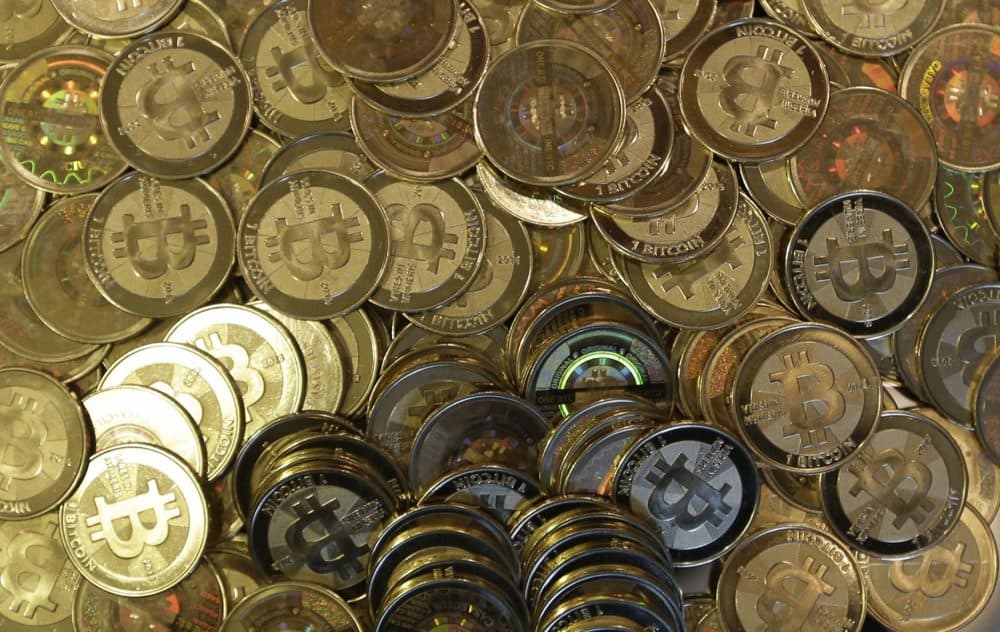Advertisement
Commentary
Bitcoin Might Be A Bubble, But It Still May Change The World

The digital currency bitcoin was undoubtedly the hot new investment last year. According to reporting by The New York Times, in the past 12 months, the price of a single bitcoin jumped from around $1,000 to over $15,000.
For the uninitiated: Bitcoin is a form of digital money that’s not connected to any government or any physical thing in the world. If you think of bitcoin as money, it is — just like dollars and euros. If you don’t — it’s a bunch of ones and zeroes floating around the internet.
Even if you’re unclear on how exactly that’s all supposed to work, you’ve probably heard about people striking it rich, almost overnight, by owning bitcoin. Maybe you even feel a twinge of envy that you didn’t buy some of your own earlier when the price was lower.
You’re not alone. Across the globe, people are mortgaging their homes and racking up credit card debt to buy bitcoins, hoping to get rich with a sale to someone else when the price goes up even more. Of course, this just increases the price further, which causes even more people to buy, resulting in a self-reinforcing cycle. That’s how we end up with Wall Street Journal headlines like “Bitcoin Mania: Even Grandma Wants In on the Action,” that seem to cross the border into self-parody.
This sort of frenzied speculation has many people arguing that bitcoin is just another speculative bubble, like dot-com companies in the 1990s, or Dutch tulips in the 1600s. (In late December, bitcoin’s price suddenly fell by over 25 percent, suggesting that the party may already be winding down.)
Others argue that bitcoin isn’t a bubble because they think it will transform the world financial system. They reason if bitcoin itself doesn’t change the world, the blockchain technology behind it just might. Again, for the uninitiated: Blockchain is a new way to keep a list of how many people own a certain thing — like bitcoins — and how ownership changes over time. It's innovative because no one person is in charge of the list. It could revolutionize the way we keep track of all sorts of things, including stocks, bonds, mortgages and contracts.
What many don’t realize is that these two arguments are not mutually exclusive: Enthusiasts may be correct about bitcoin's potential to revolutionize how the world operates, and it could still be a speculative bubble that will cost investors billions when it bursts.
That’s almost exactly what happened during the 1990s.
The ‘90s dot-com bubble was driven by the belief that the internet would change everything and that tiny dot-com startups would end up dominating the American economy. The hot dot-coms of the ‘90s though, including Pets.com, Netscape Communications and America Online, weren’t the ones to do it. By 2000, most of the ‘90s startups were bankrupt and investors had lost more than $1 trillion. It was only much later that the internet-based companies that dominate today’s landscape, including Facebook, Twitter, Google and Netflix, showed up to fulfill the promise of the 1990s bubble.
Though the underlying idea motivating the dot-com boom was sound, the specific companies people invested in went bust. Today there are dozens of other cryptocurrencies built on the same technology and philosophy as bitcoin. CNBC reports that, despite its rapid rise in value, bitcoin currently represents only about 36 percent of the total value of all cryptocurrencies, down from 80 percent at the beginning of 2017.
Cryptocurrencies may eventually become a major part of world finance, even as bitcoin itself ends up a failed forerunner like America Online.
It took longer than a decade after the dot-com bubble for internet companies to ascend to the peak of the U.S. economy. (Consider Amazon: It’s become the corporate juggernaut investors thought it could be, but it took 10 years for its stock price to reach $100 again after cratering to less than $5 per share.) Bitcoin wants a much more radical change — to become a mainstream currency without any connection to a government or physical object like gold — so it could take even longer, if it happens at all.
So, current bitcoin owners: If you are content to hold onto your bitcoins for a few decades — as many cryptocurrency enthusiasts are — OK. But if you’re looking to get rich quick, bitcoin might not be for you, even if it really is the wave of the future.
The philosopher George Santayana said, “those who cannot remember the past are condemned to repeat it.” If we don’t remember the lessons of the 1990s we might be condemned to repeat them, and get burned by a good idea that got too hot too soon.
